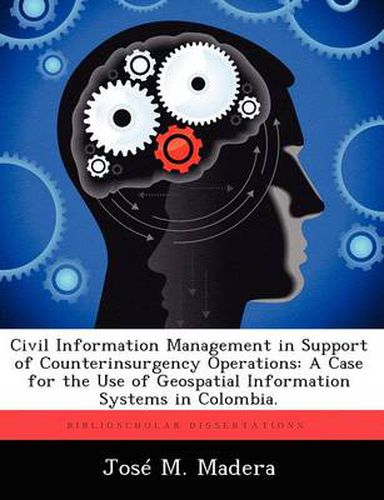Readings Newsletter
Become a Readings Member to make your shopping experience even easier.
Sign in or sign up for free!
You’re not far away from qualifying for FREE standard shipping within Australia
You’ve qualified for FREE standard shipping within Australia
The cart is loading…






This title is printed to order. This book may have been self-published. If so, we cannot guarantee the quality of the content. In the main most books will have gone through the editing process however some may not. We therefore suggest that you be aware of this before ordering this book. If in doubt check either the author or publisher’s details as we are unable to accept any returns unless they are faulty. Please contact us if you have any questions.
Civil Information Management Systems (CIMS) are emerging as a resource which allows commanders to build a Common Operational Picture (COP) upon which to base their operational planning and execution. Geospatial Information Systems (GIS) are a type of CIMS. GIS have been underutilized by the military which traditionally uses geographic data as cartographic and imagery support for military intelligence and maneuver purposes. This monograph provides a framework for determining the value of using GIS as a tool in counterinsurgency (COIN). Given the crucial role that geography plays in the Colombian internal conflict, this case presents a unique opportunity to evaluate the capabilities that GIS offer. Recent experience shows that, despite achieving a significant measure of success on the battlefield, the Armed Forces of the United States of America face continuing challenges in adapting to the requirements of a long term global struggle. The nature of the current conflict or Long War requires effective engagement, coordination, and collaboration with interagency and international partners. Counterinsurgency efforts in Colombia are an example of this environment, and this study concludes that the applicability of GIS in that context posits the desirability of applying these capabilities in other counterinsurgency settings. Based upon the above, two proposals are made; (1) further developing and analyzing existing GIS data sets for Colombia by applying a Civil Information collection methodology and (2) developing and integrating a robust Civil Information based GIS capability within the U.S. Joint Forces supporting counterinsurgency efforts in Colombia and elsewhere.
$9.00 standard shipping within Australia
FREE standard shipping within Australia for orders over $100.00
Express & International shipping calculated at checkout
This title is printed to order. This book may have been self-published. If so, we cannot guarantee the quality of the content. In the main most books will have gone through the editing process however some may not. We therefore suggest that you be aware of this before ordering this book. If in doubt check either the author or publisher’s details as we are unable to accept any returns unless they are faulty. Please contact us if you have any questions.
Civil Information Management Systems (CIMS) are emerging as a resource which allows commanders to build a Common Operational Picture (COP) upon which to base their operational planning and execution. Geospatial Information Systems (GIS) are a type of CIMS. GIS have been underutilized by the military which traditionally uses geographic data as cartographic and imagery support for military intelligence and maneuver purposes. This monograph provides a framework for determining the value of using GIS as a tool in counterinsurgency (COIN). Given the crucial role that geography plays in the Colombian internal conflict, this case presents a unique opportunity to evaluate the capabilities that GIS offer. Recent experience shows that, despite achieving a significant measure of success on the battlefield, the Armed Forces of the United States of America face continuing challenges in adapting to the requirements of a long term global struggle. The nature of the current conflict or Long War requires effective engagement, coordination, and collaboration with interagency and international partners. Counterinsurgency efforts in Colombia are an example of this environment, and this study concludes that the applicability of GIS in that context posits the desirability of applying these capabilities in other counterinsurgency settings. Based upon the above, two proposals are made; (1) further developing and analyzing existing GIS data sets for Colombia by applying a Civil Information collection methodology and (2) developing and integrating a robust Civil Information based GIS capability within the U.S. Joint Forces supporting counterinsurgency efforts in Colombia and elsewhere.